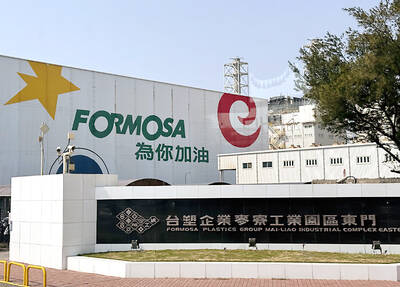Banks involved in a syndicated loan to lossmaking ProMOS Technologies Inc (茂德科技) are mulling steps to deal with potential default if the nation’s third-largest maker of computer memory chips fails to reverse its finances.
The Hsinchu-based computer memory chipmaker owes more than NT$50 billion (US$1.74 billion) in bank loans to more than 20 state-run and private lenders. It reported a loss of NT$4.26 billion for the first quarter, according to Taiwan Stock Exchange data. As of March, the company accumulated NT$69.85 billion in debt, while owning NT$74.48 billion in assets.
State-run Taiwan Cooperative Bank (TCB, 合作金庫), which has loaned ProMOS more than NT$7 billion in a syndicated loan led by Bank of Taiwan (臺灣銀行), would consider revising lending terms when renewing the contract at the end of the year to better protect its debt, TCB chairman Liu Teng-cheng (劉燈城) said by telephone.
A default by ProMOS two or three years ago would have dealt a serious blow to the banking industry, but would have a limited impact now that the sector has emerged from the global financial crisis with record-high provision funds, Liu said.
The banking sector’s coverage ratio (of provisions over bad loans) rose to a new high of 176.4 percent at the end of April, while the bad loan ratio dropped to a new low of 0.54 percent, according to the latest government statistics.
TCB has set aside provisions for a potential default by ProMOS even though the firm so far has managed to make interest payments regularly, Liu said.
Liu does not expect an easy solution to the ProMOS loan, which is tied to the government’s policy on the DRAM sector.
First Commercial Bank (第一銀行), the flagship unit of state-run First Financial Holding Co (第一金控), said a ProMOS default in the worst-case scenario would not significantly affect its earnings or asset quality.
First Bank’s provision of funds total more than NT$10 billion, which would allow the lender to absorb some of its NT$1.8 billion loan to the technology firm in case of a default, executive vice president Lin Hann-chyi (林漢奇) said.
Mega International Commercial Bank (兆豐國際商銀), the banking arm of state-run Mega Financial Holdings Co (兆豐金控), expressed a similar view.
Mega Bank makes it a policy to set aside provisions of up to 10 percent of loans with companies under its observation list, Mega Financial executive vice president Grace Lin (林瑞雲) said.
All money-losing borrowers are included in the list, Lin said, adding the ratio for ProMOS is higher given its shaky financial situation.

EXTRATERRITORIAL REACH: China extended its legal jurisdiction to ban some dual-use goods of Chinese origin from being sold to the US, even by third countries Beijing has set out to extend its domestic laws across international borders with a ban on selling some goods to the US that applies to companies both inside and outside China. The new export control rules are China’s first attempt to replicate the extraterritorial reach of US and European sanctions by covering Chinese products or goods with Chinese parts in them. In an announcement this week, China declared it is banning the sale of dual-use items to the US military and also the export to the US of materials such as gallium and germanium. Companies and people overseas would be subject to

Taiwan Semiconductor Manufacturing Co (TSMC, 台積電) founder Morris Chang (張忠謀) yesterday said that Intel Corp would find itself in the same predicament as it did four years ago if its board does not come up with a core business strategy. Chang made the remarks in response to reporters’ questions about the ailing US chipmaker, once an archrival of TSMC, during a news conference in Taipei for the launch of the second volume of his autobiography. Intel unexpectedly announced the immediate retirement of former chief executive officer Pat Gelsinger last week, ending his nearly four-year tenure and ending his attempts to revive the

WORLD DOMINATION: TSMC’s lead over second-placed Samsung has grown as the latter faces increased Chinese competition and the end of clients’ product life cycles Taiwan Semiconductor Manufacturing Co (TSMC, 台積電) retained the No. 1 title in the global pure-play wafer foundry business in the third quarter of this year, seeing its market share growing to 64.9 percent to leave South Korea’s Samsung Electronics Co, the No. 2 supplier, further behind, Taipei-based TrendForce Corp (集邦科技) said in a report. TSMC posted US$23.53 billion in sales in the July-September period, up 13.0 percent from a quarter earlier, which boosted its market share to 64.9 percent, up from 62.3 percent in the second quarter, the report issued on Monday last week showed. TSMC benefited from the debut of flagship

TENSE TIMES: Formosa Plastics sees uncertainty surrounding the incoming Trump administration in the US, geopolitical tensions and China’s faltering economy Formosa Plastics Group (台塑集團), Taiwan’s largest industrial conglomerate, yesterday posted overall revenue of NT$118.61 billion (US$3.66 billion) for last month, marking a 7.2 percent rise from October, but a 2.5 percent fall from one year earlier. The group has mixed views about its business outlook for the current quarter and beyond, as uncertainty builds over the US power transition and geopolitical tensions. Formosa Plastics Corp (台灣塑膠), a vertically integrated supplier of plastic resins and petrochemicals, reported a monthly uptick of 15.3 percent in its revenue to NT$18.15 billion, as Typhoon Kong-rey postponed partial shipments slated for October and last month, it said. The